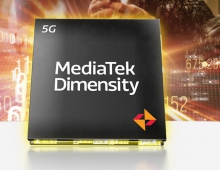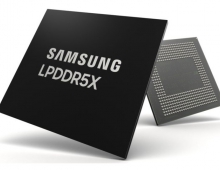
MediaTek Releases New Smartphone Chips
MediaTek is launching the P23 and the P30 SoCs for middle-tier handsets that the company expects to lead market growth.
The focus for the new chips will be on dual-camera smartphones that narrow the gap separating mid-range smartphones from the high-end offerings of Apple and Samsung. Both of the octa-core MediaTek chips will deliver LTE carrier aggregation and performance up to 2.3 GHz.
MediaTek is aiming at increasing middle-class consumers in emerging markets like India and China.
For MediaTek, the aim is to deliver high-end camera features and performance balanced with affordable price points.
Both chips are made with Taiwan Semiconductor Manufacturing Co.'s 16-nm FinFET process technology.
The P23 and P30 are built with eight Arm Cortex-A53 processors operating up to 2.3 GHz. The SoCs feature the new Mali G71 MP2 GPU, clocked at 770 MHz in the P23 and 950 MHz in the P30 to deliver high-end graphics performance.
The P23 and P30 are the first in MediaTek's Helio line designed for dual-camera smartphones. The P23 supports 13+13 megapixel dual-camera phones, while the P30 supports up to 16+16 megapixels. They also support single-camera modes up to 24 megapixels in the P23 and 25 megapixels in the P30.
The P23 and P30 feature MediaTek?s latest generation 4G LTE WorldMode modem. The P23 supports Cat 7 with two carriers in the uplink and two carriers in the downlink at a peak speed of 300 megabits down and 100 megabits up.
The P30 modem supports 64 QAM, allowing the uplink speed to increase to 150 megabits per second, which is also referred to as Cat 13.
The MediaTek Helio P23 delivers the first dual-SIM, dual-4G VoLTE/ViLTE support to provide faster, more consistent connectivity for users who use two SIM cards.
The chips incorporate MediaTek?s Imagiq 2.0 technology to minimize aliasing, grain, and noise and reduce chromatic aberration.
The P30 features a new vision processing unit, a dedicated 500-MHz Tensilica DSP paired to image signal processors to free system resources and enable power savings, customization of camera functionality by OEMs, and performance improvements including multi-application and multi-function tasks.
The Helio P23 has a dedicated multimedia processing unit designed to decode H.265 (HEVC) 4K2K video at 30 fps for low-power video playback of the latest video encoding standard used by numerous streaming services. On the Helio P23, this combination of design choices extends use between battery charges.
Phones made with the chips will probably fall in a retail price range of about $150 to $500.





















